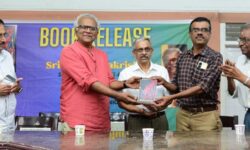THIRUVANANTHAPURAM:
Even as the sunset years of the erstwhile princely state of Travancore were mired in controversies including repression of public agitations and uprisings, that was also a period of commendable industrial and infrastructure development, observed Dr Shashi Tharoor, MP.
Dr Tharoor was speaking after the launch of the book ‘Anti-Monarchical Conflict in Kerala 1931-1947’, written by Dr D Daniel, a former Professor and Chairperson, School of Historical Studies, Madurai Kamaraj University.
The work closely traces the twilight years of the princely state in down south since the ascension of the last Maharaja Sree Chitra Tirunal, who was in a symbiotic relationship with the then Diwan C P Ramaswamy Aiyar. The period was marked by two striking trends—the growth of nationalism led by Travancore State Congress and that of Communism.
“Though the twilight phase of Travancore monarchy under the reign of often reviled Maharaja of Travancore, Sree Chitra Tirunal, and Diwan Sir C P Ramaswamy Aiyar had several repercussions, it also witnessed commendable developments and reforms that resulted in industrialisation and progress of the State,” said Dr Tharoor, after releasing the book by handing over the first copy to Dr Venu V, Chief Secretary, Government of Kerala.
“There was cruelty shown and many of us continue to commemorate the heroes and victims of the agitations and the nationalist movement of the final phase of Travancore monarchy. But I do believe that we do need to accept the contributions of Sree Chitra Tirunal, who was a visionary king, and Diwan CP Ramasway Aiyar, who assisted, abetted, and implemented all of these initiatives deserve a little bit of credit, particularly that led to the industrialisation and progress of the State”, Dr Tharoor said.
The King and the Diwan had done some extraordinary things, which continued to benefit generations of people in Thiruvananthapuram for many years, noted Tharoor, a three-time MP of Kerala capital.
Dr Tharoor also appreciated Dr Daniel for vividly illustrating the complex interaction of caste, class, and religion during the period.
Dr Venu V, however, struck a different note saying, “Good government is no substitute to self-government.”
To all the wonderful things Sir CP had engineered and the monarch had sanctioned, history tells us that this would never be equivalent to people’s right to govern themselves, Dr Venu said.
Noting that Dr Daniel’s book focussed on the conflicts against the monarchy, Dr Venu said, “though there are several things that the regime had done, which provided a lasting and tangible legacy for the State, those things cannot be put into the context of the conflicts and struggles of all the unspeakable things that happened during the last 15 years of the monarchy, which forms the crux of the work.”
Referring to the extensive research done by the author, Dr Venu urged the research scholars to utilise the available resource facilities to have a better understanding of the history.
Introducing the book, M G Radhakrishnan, Senior Journalist and former Editor of Asianet News, said this work stands out as it brings to light a huge amount of minute details of the period by tapping a wide array of sources.
Dr Shaji Anirudhan, Professor and Head of the Department of History, University of Kerala, presided over the function. Dr Daniel proposed a vote of thanks at the function.
P Raveendran Nayar, Folio, the publisher of the book, welcomed the gathering.




